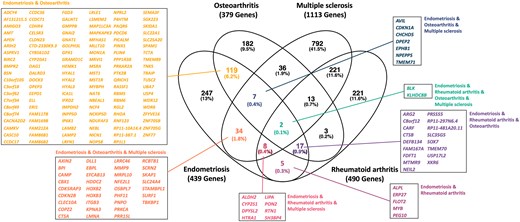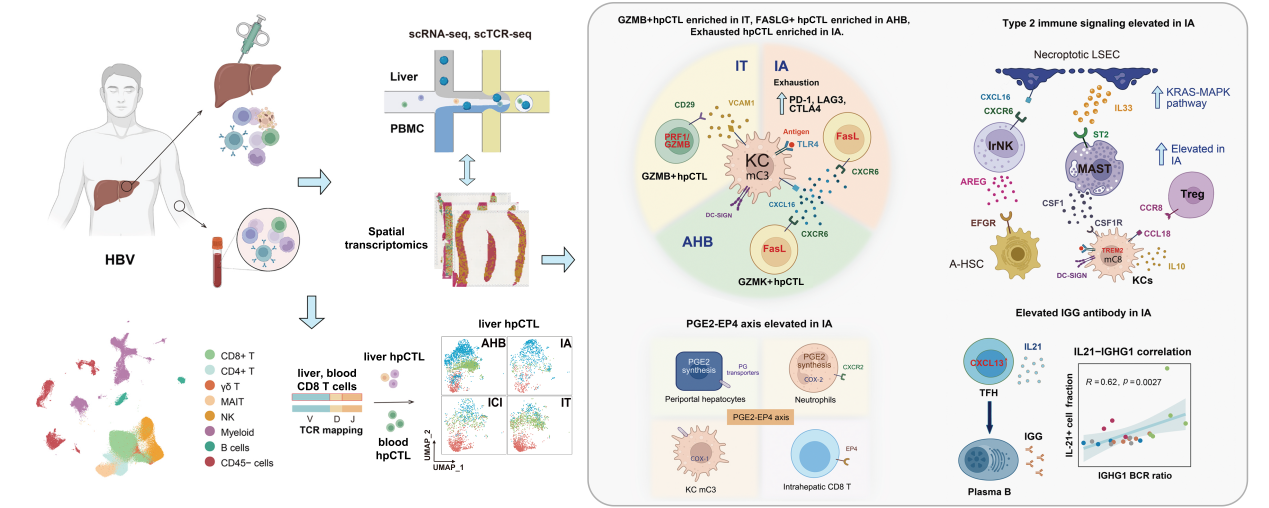2025-04-28 オックスフォード大学
<関連情報>
- https://www.ox.ac.uk/news/2025-04-28-new-research-reveals-shared-genetic-link-between-endometriosis-and-immune-conditions
- https://academic.oup.com/humrep/advance-article/doi/10.1093/humrep/deaf062/8117905
子宮内膜症と免疫疾患との表現型および遺伝的関連性 The phenotypic and genetic association between endometriosis and immunological diseases
Nina Shigesi , Holly R Harris , Hai Fang , Anne Ndungu , Matthew R Lincoln , The International Endometriosis Genome Consortium , The 23andMe Research Team , Chris Cotsapas , Julian Knight , Stacey A Missmer …
Human Reproduction Published:22 April 2025
DOI:https://doi.org/10.1093/humrep/deaf062

Abstract
STUDY QUESTION
Is there an increased risk of immunological diseases among endometriosis patients, and does a shared genetic basis contribute to this risk?
SUMMARY ANSWER
Endometriosis patients show a significantly increased risk of autoimmune, autoinflammatory, and mixed-pattern diseases, including rheumatoid arthritis, multiple sclerosis, coeliac disease, osteoarthritis, and psoriasis, with genetic correlations between endometriosis and osteoarthritis, rheumatoid arthritis, and multiple sclerosis, and a potential causal link to rheumatoid arthritis.
WHAT IS KNOWN ALREADY
The epidemiological evidence for an increased risk of immunological diseases among women with endometriosis is limited in scope and has varied in robustness due to the opportunity for biases. The presence of a biological basis for increased comorbidity across immunological conditions has not been investigated. Here we investigate the phenotypic and genetic association between endometriosis and 31 immune conditions in the UK Biobank.
STUDY DESIGN, SIZE, DURATION
Phenotypic analyses between endometriosis and immune conditions (17 classical autoimmune, 10 autoinflammatory, and 4 mixed-pattern diseases) were conducted using two approaches (8223 endometriosis, 64 620 immunological disease cases): (i) retrospective cohort study design to incorporate temporality between diagnoses and (ii) cross-sectional analysis for simple association. Genome-wide association studies (GWAS) and meta-analyses for those immune conditions that showed phenotypic association with endometriosis (1493–77 052 cases) were conducted.
PARTICIPANTS/MATERIALS, SETTING, METHODS
Comprehensive phenotypic association analyses were conducted in females in the UK Biobank. GWAS for immunological conditions were conducted in females-only and sex-combined study populations in UK Biobank and meta-analysed with existing largest available GWAS results. Genetic correlation and Mendelian randomization (MR) analyses were conducted to investigate potential causal relationships. Those immune conditions with significant genetic correlation with endometriosis were included in multi-trait analysis of GWAS to boost discovery of novel and shared genetic variants. These shared variants were functionally annotated to identify affected genes utilizing expression quantitative trait loci (eQTL) data from GTEx and eQTLGen databases. Biological pathway enrichment analysis was conducted to identify shared underlying biological pathways.
MAIN RESULTS AND THE ROLE OF CHANCE
In both retrospective cohort and cross-sectional analyses, endometriosis patients were at significantly increased (30–80%) risk of classical autoimmune (rheumatoid arthritis, multiple sclerosis, coeliac disease), autoinflammatory (osteoarthritis), and mixed-pattern (psoriasis) diseases. Osteoarthritis (genetic correlation (rg) = 0.28, P = 3.25 × 10-15), rheumatoid arthritis (rg = 0.27, P = 1.5 × 10-5) and multiple sclerosis (rg = 0.09, P = 4.00 × 10-3) were significantly genetically correlated with endometriosis. MR analysis suggested a causal association between endometriosis and rheumatoid arthritis (OR = 1.16, 95% CI = 1.02–1.33). eQTL analyses highlighted genes affected by shared risk variants, enriched for seven pathways across all four conditions, with three genetic loci shared between endometriosis and osteoarthritis (BMPR2/2q33.1, BSN/3p21.31, MLLT10/10p12.31) and one with rheumatoid arthritis (XKR6/8p23.1).
LIMITATIONS, REASONS FOR CAUTION
We conducted the first female-specific GWAS analyses for immune conditions. Given the novelty of these analyses, the sample sizes from which results were derived were limited compared to sex-combined GWAS meta-analyses, which limited the power to use female-specific summary statistics to uncover the shared genetic basis with endometriosis in follow-up analyses. Secondly, the 39 genome-wide significant endometriosis-associated variants used as instrumental variables in the MR analysis explained approximately 5% of disease variation, which may account for the nominal or non-significant MR results.
WIDER IMPLICATIONS OF THE FINDINGS
Endometriosis patients have a moderately increased risk for osteoarthritis, rheumatoid arthritis, and to a lesser extent, multiple sclerosis, due to underlying shared biological mechanisms. Clinical implications primarily involve the need for increased awareness and vigilance. The shared genetic basis opens up opportunities for developing new treatments or repurposing therapies across these conditions.


